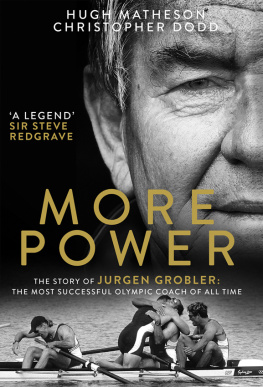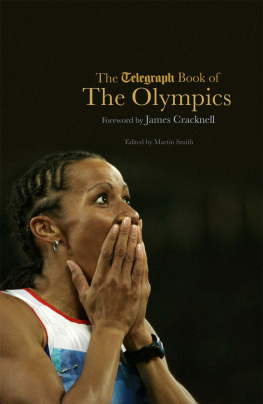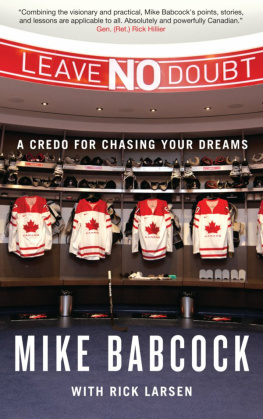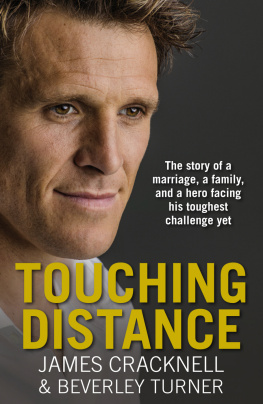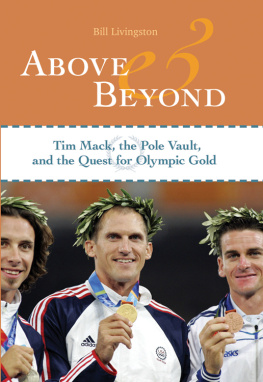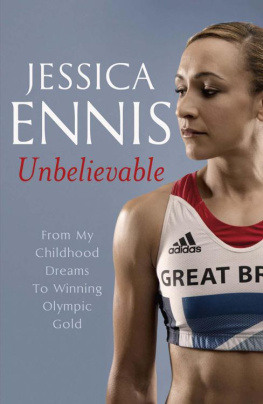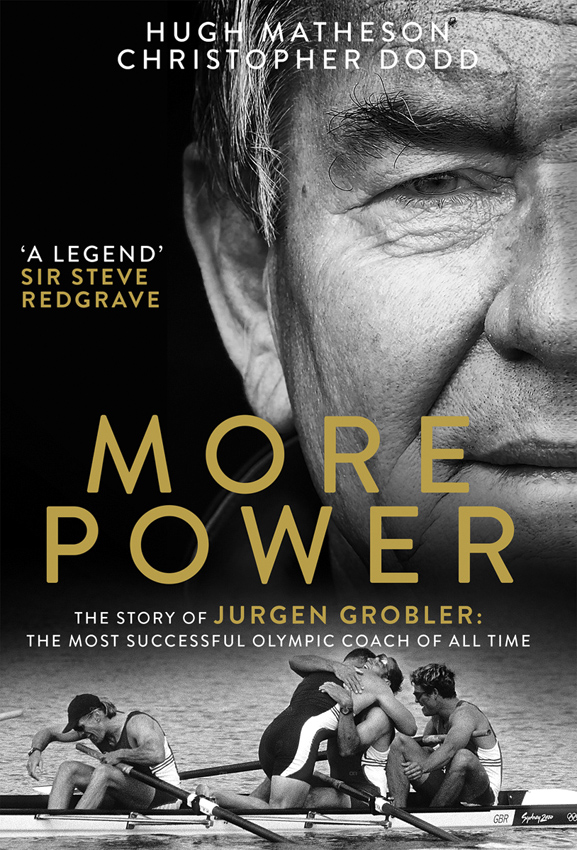In collecting a lifetimes worth of quotations and information to tell Jurgens story the authors have striven for accuracy, and we bear sole responsibility for any mistakes that may come to light. While written sources are outlined in the Bibliography, we would like to thank the many athletes, coaches, officials and journalists who have talked to us and given us valuable information. In particular, More Power is a better book for the assistance of Astrid Ayling with German matters and contributions from the following:
Mark Banks, Brigitte Berendonk, John Boultbee, Ed Coode, Martin Cross, Klaus Filter, Prof. Werner Franke, Tim Foster, Brendan Gallaher, Toby Garbett, Alex Gregory, Garry Herbert, Phelan Hill, Andrew Triggs Hodge, Tom James, Bob Janousek, Ivor Lloyd, Constantine Louloudis, John Pilgrim-Morris, Lord Moynihan, Birgit Peter, Sir Matthew Pinsent, Sir Steve Redgrave, Pete Reed, Moe Sbihi, Peter Schwanitz, Greg Searle, Jonny Searle, Catherine Shakespeare, Matt Smith, Jana Sorgers, Peter Spurrier, Sir David Tanner, Paul Thompson, Andy Trotman, Ian Wilson, Arnie and Roswitha Zarach.
From the inception of More Power, the authors invited Jurgen to take part in interviews and accompany us on his journey. After much deliberation he decided not to be involved officially with a biography or autobiography until he has finished coaching a position he has consistently maintained for a decade or more. To Jurgens great credit we have enjoyed informal discussions on several occasions while this book was in preparation and relations between the books subject and its writers have remained as cordial as they have been since Jurgens arrival in Britain in 1991.
We would also like to thank Nick Bates for his enthusiastic support as publisher at HQ/Harper Collins, Charlotte Atyeo, our meticulous editor, and our indefatigable agent Charlie Campbell of Kingsford Campbell.
Hugh Matheson and Christopher Dodd
THE AUTHORS have been rowing correspondents and commentators throughout Jurgen Groblers two lives. They met when Hugh Matheson was rowing in the national squad in the early 1970s and Chris Dodd was chasing the squad round the regatta circuit on behalf of the Guardian. In one capacity or another, they have witnessed all of Groblers World and Olympic performances. When Dodds Guardian colleague Charlie Burgess was appointed sports editor of the new Independent newspaper in 1986 and sought a rowing specialist, Dodd recommended Matheson who had recently retired as a competitor.
HUGH MATHESONs rowing career began when he fell into the Thames, aged thirteen, alongside the rafts at Eton. He thrived on the challenge of rowing, loved the adrenalin of racing and was hooked. Ten years on he was rowing in the British coxed four at the Munich Olympics, off the pace and finishing tenth.
Following a silver medal in the Montreal Olympic Games and a year off adapting to an unexpected inheritance in Sherwood Forest, Matheson bought a single sculling boat and found that he preferred to be solely responsible for his failures and successes. Having no one else to blame and no one else to claim the glory was the drug, although it left few excuses for a lamentable sixth place after a boat-stopping entanglement with a lane marker in the final of the single sculls in the Moscow Olympics of 1980.
At the Atlanta Olympics ten years later, Matheson became a summariser for Eurosport, an all-sports subscription television channel. This is his first book.
CHRIS DODD has written about rowing in newspapers, magazines and books since the coming of Janouek in 1970. His introduction to rowing was as a schoolboy cox at Clifton College, having no talent for cricket. He progressed to the stroke seat of his schools second eight, a crew that satisfyingly beat the first eight in a challenge race at the end of the season. He stopped rowing after his first term at Nottingham University to edit the student newspaper, which led to a career on the Guardian in 1965.
As a Guardian staffer, his main job was layout, design and section editing in the features department, but he also worked on the sport and city pages. He began writing about rowing at weekends in 1970, covering Boat Races and Henley regattas. He covered his first world championships in 1974 to witness Mathesons eight win a silver medal, and his first Olympics in 1984 to see Steve Redgrave launch his golden Olympic career in Los Angeles.
Dodd was the founding editor of Britains Regatta magazine and FISAs World Rowing magazine.
In 1994 Dodd turned freelance when his off-the-wall scheme to set up the River & Rowing Museum in Henley-on-Thames became a reality. He was responsible for creating the rowing collection and library and curating special exhibitions.
Dodd is a board member of the Friends of Rowing History and has contributed to history symposia at the River & Rowing Museum and Mystic Seaport. From 1994 he continued as rowing correspondent at the Guardian until moving to the Independent in 2004.
This is his tenth book (for book details see www.doddsworld.org)
Henley Royal Regatta (1981)
The Oxford and Cambridge Boat Race (1983)
Boating (1983)
The Story of World Rowing (1992)
Battle of the Blues (Ed, 2004)
Water Boiling Aft (2006)
Pieces of Eight (2012)
Bonnie Brave Boat Rowers (2014)
Unto the Tideway Born (2015)
Stasi records revealing the contents of personal files compiled by informers for the East German secret police became available in 1998. Their publication triggered press inquiries to sports bodies and employers of former East German coaches. Regatta magazine offered Jurgen Grobler the opportunity to tell his story in his own words. Grobler declined, but during the next few weeks he was forced to break his silence, particularly in answer to a sustained campaign of insinuations made by the Mail on Sunday. Some sections from those articles demonstrating the order of events are outlined here:
Ian Pocock and James Toney, Mail on Sunday, 15 February:
Steve Redgrave, Britains greatest Olympian, is being coached by a man, now alleged to have been a key figure in East Germanys reviled programme of drug cheats. Evidence from Professor Werner Franke the foremost authority on sports doping under the old Communist regime is claimed to link the coach Jrgen Grobler to the use of drugs to boost East German sports men and women. Franke alleges Grobler forced the testosterone-based drug, Clomiphen, on aspiring international rowers during his time as East German rowing coach. Grobler was instrumental in the decision-making of doping, said Franke.
On the 16th February the ARA responded in a statement with full confidence in their appointment:
Recent speculation, whilst not to be treated lightly, is rumour and comment that has surfaced from time to time over recent months. However, given our own certainty of being a clean sport, and the success we have achieved under his coaching guidance the ARA expresses full confidence in Jrgen Grobler as its mens chief coach.
Grobler himself subsequently appeared on BBC Newsnight (albeit by telephone) with reporter Adam Mynott, 19 February:
I have to live with what went on in East Germany. I was born in the wrong place. It was difficult to have the strength to say no. That is difficult for me. All I can say is that no one was forced. They could walk away. I look in the mirror and see myself. I had to live with a system that I knew was wrong.
Wilfried Hofmann, former president of the East German rowing association, former chairman of FISAs junior commission and former manager of Dynamo Berlin (the police sports club), spoke to

